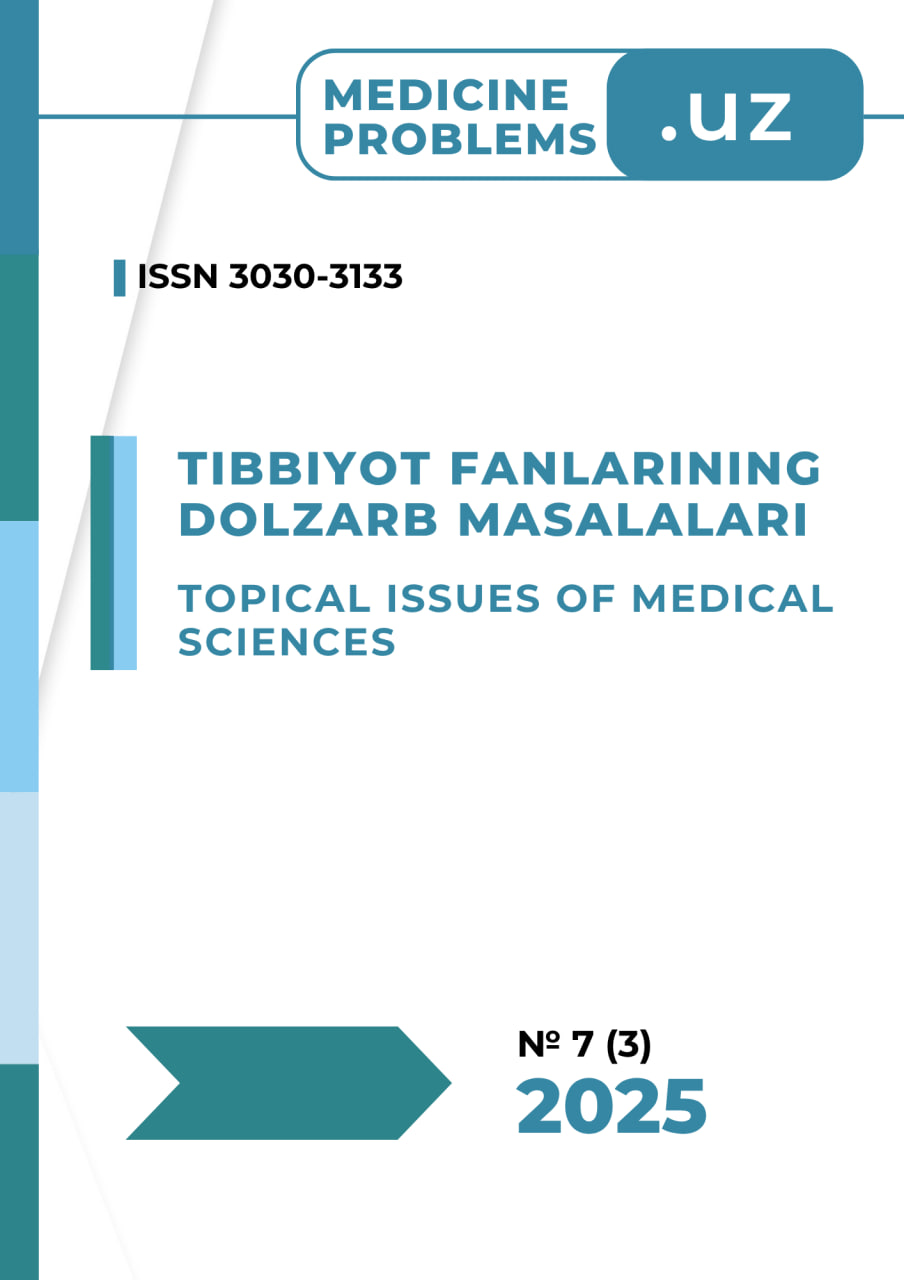MARKAZIY OSIYO POPULYATSIYASIDA “SPORTCHI YURAGI” FENOMENI: O'ZBEKISTON SPORTCHI VA HARBIYLARINING ELEKTROKARDIOGRAFIK VA EXOKARDIOGRAFIK O‘ZIGA XOS XUSUSIYATLARI
Kalit so'zlar
https://doi.org/10.47390/Med-pro/v3i7y2025/N04Kalit so'zlar
sportchi yuraki, to'satdan yurak o'limi, sportchi EKGsi, chap qorinchacha gipertrofiyasi, skrining, ESC tavsiyalari.Annotasiya
Maqsad: O‘zbekiston sportchilari va harbiy xizmatchilarning yurak elektrokardiografik va exokardiografik xususiyatlarini xalqaro konsensuslar (ESC 2022, AHA/ACC) asosida tahli l qilish va jismoniy mashqlar bilan shug‘ullanuvchi shaxslarda to‘satdan o‘lim omillarini skrining qilish bo‘yicha amaliy tavsiyalar ishlab chiqish.
Usullar: Tadqiqotda yuqori malakali 75 nafar sportchi va 44 nafar harbiy xizmatchi ishtirok etdi. Barcha ishtirokchilarga EKG va ExoKG tekshiruvlari o‘tkazildi. Olingan ma'lumotlar "Sietl tavsiyalari" (2013) va ESCning yangi sport kardiologiyasi bo‘yicha tavsiyalari (2022) bilan solishtirildi.
Natijalar: Xarakterli moslashish o'zgarishlari aniqlandi: sinus bradikardiyasi (4%), I darajali AV-blokada (3%), QT intervalining cho'zilishi (346±26 ms). Sportchilarning chap qorinchacha massa indeksi 130,88±3,17 g/m² ni tashkil etdi, bu ESC 2022 ning chegaraviy qiymatlaridan oshadi, lekin sistolik va diastolik funksiyaning saqlanganligi sharoitida kontsentrik fiziologik gipertrofiya modeliga mos keladi. Harbiy xizmatchilarda ham asosan mashqlarning tabiati bilan bog'liq kontsentrik chap qorinchacha gipertrofiyasi kuzatildi.
Xulosa: Tadqiqot natijalari asosan xalqaro ma'lumotlar bilan mos keladi, lekin o'zbek populyatsiyasida o'ziga xos xususiyatlarni namoyon qiladi, bu milliy skrining protokollarini ishlab chiqishda hisobga olinishini talab qiladi.
Manbalar
1. Corrado D, Pelliccia A, Bjørnstad HH, et al. Cardiovascular pre-participation screening of young competitive athletes for prevention of sudden death: proposal for a common European protocol. Consensus Statement of the Study Group of Sport Cardiology of the Working Group of Cardiac Rehabilitation and Exercise Physiology and the Working Group of Myocardial and Pericardial Diseases of the European Society of Cardiology. Eur Heart J. 2005;26(5):516-524. doi:10.1093/eurheartj/ehi108
2. Baggish AL, Wood MJ. Athlete's heart and cardiovascular care of the athlete: scientific and clinical update. Circulation. 2021;143(17):1693-1705. doi:10.1161/ CIRCULATIONAHA.120.052386
3. Maron BJ, Friedman RA, Kligfield P, et al. Assessment of the 12-lead electrocardiogram as a screening test for detection of cardiovascular disease in healthy general populations of young people (12-25 years of age): a scientific statement from the American Heart Association and the American College of Cardiology. J Am Coll Cardiol. 2014;64(14):1479-1514. doi:10.1016/j.jacc.2014.05.006
4. Drezner JA, Sharma S, Baggish A, et al. International criteria for electrocardiographic interpretation in athletes: Consensus statement. Br J Sports Med. 2017;51(9):704-731. doi:10.1136/bjsports-2016-097331
5. Drezner JA, Ackerman MJ, Anderson J, et al. Electrocardiographic interpretation in athletes: the 'Seattle criteria'. Br J Sports Med. 2013;47(3):122-124. doi:10.1136/bjsports-2012-092067
6. Pelliccia A, Sharma S, Gati S, et al. 2020 ESC Guidelines on sports cardiology and exercise in patients with cardiovascular disease. Eur Heart J. 2021;42(1):17-96. doi:10.1093/eurheartj/ehaa605
7. Rawlins J, Carre F, Kervio G, et al. Ethnic differences in physiological cardiac adaptation to intense physical exercise in highly trained female athletes. Circulation. 2010;121(9):1078-1085. doi:10.1161/CIRCULATIONAHA.109.917211
8. Sheikh N, Papadakis M, Ghani S, et al. Comparison of electrocardiographic criteria in black vs. white athletes. Circulation. 2014;130(15):1240-1249. doi:10.1161/ CIRCULATIONAHA.114.011853
9. Malhotra R, West JJ, Dent J, et al. Cost and yield of adding electrocardiography to history and physical in screening Division I collegiate athletes for heart disease. J Am Coll Cardiol. 2018;72(5):546-553. doi:10.1016/j.jacc.2018.05.028
10. Wasfy MM, Baggish AL. Exercise Dose in Clinical Practice. Circulation. 2016;133(22):2297-2313. doi:10.1161/CIRCULATIONAHA.116.018093
11. Gati S, Sheikh N, Ghani S, et al. Should axis deviation or atrial enlargement be categorised as abnormal in young athletes? The athlete's electrocardiogram: time for re-appraisal of markers of pathology. Eur Heart J. 2013;34(47):3641-3648. doi:10.1093/ eurheartj/eht296
12. Gati S, Rajani R, Carr-White GS, Chambers JB. Adult left ventricular noncompaction: reappraisal of current diagnostic imaging modalities. JACC Cardiovasc Imaging. 2014;7(12):1266-1275. doi:10.1016/j.jcmg.2014.09.005
13. Corrado D, Michieli P, Basso C, Schiavon M, Thiene G. How to screen athletes for cardiovascular diseases? Cardiol Clin. 2007;25(3):391-397. doi:10.1016/ j.ccl.2007.06.003
14. Vetter VL, Dugan N, Guo R, et al. A pilot study of the feasibility of heart screening for sudden cardiac arrest in healthy children. Am Heart J. 2021;231:56-67. doi:10.1016/j.ahj.2020.10.057
15. DeGroot DW, O'Connor FG, Roberts WO. The Military Athlete: A Review of the Management and Prevention of Musculoskeletal Injuries in the United States Armed Forces. J Spec Oper Med. 2019;19(3):119-125.



